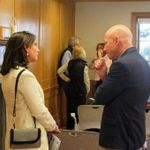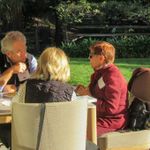Advances in AI: Diagnosis & Treatment of Neurological and Neurodegenerative Disorders Symposium
October 24th, 2025

On Friday, October 24th, leading researchers from the Boston University Center for Brain Recovery (CBR) traveled to the San Francisco Bay Area to present their ground-breaking work leveraging artificial intelligence and machine learning tools for detection, treatment, and prediction of neurological and neurodegenerative disorders.
Hosted in collaboration with the Tianqiao and Chrissy Chen Institute, this event brought together Boston University community members, alumni, and parents alongside neurotechnology and healthcare industry professionals and scholars.
Our speakers presented their innovative research applying advances in artificial intelligence to improve our ability to address the complex problem of treating, curing, and preventing brain disorders.

Introduction to the Center for Brain Recovery
Dr. Swathi Kiran, Founding Director of the Center for Brain Recovery, opened the event by introducing CBR’s work and mission. Designed as a nexus for interdisciplinary researchers, the Center for Brain Recovery has numerous published and in-progress research studies examining how artificial intelligence tools can be leveraged to:
- Detect and identify neurological disorders earlier
- Understand the mechanisms underlying the diseases
- Evaluate which treatments work for which patients
- Enable success in the real world
Additionally, Dr. Kiran welcomed Dr. Yan Li, Executive Director of Scientific Programs for the Tianqiao and Chrissy Chen Institute, to the stage. Dr. Li introduced the Chen Institute and shared some words about their organization’s collaboration efforts with the Center for Brain Recovery.

AI-enabled neurological workups: from differential diagnosis to biomarker assessment
Dr. Vijaya B. Kolachalama, a CBR Core Faculty member, presented on his lab’s research developing assistive tools for clinical practice. By combining patient information with multimodal cognitive and neurological data, Dr. Kolachalama’s work explores how AI can aid in performing differential diagnosis of dementia. This research aims to improve the clinical screening process by accounting
for missing data on individuals, identifying cognitive impairments amongst patients, and determining the primary root causes for impairment.

Novel wearable technology for rehabilitation in Parkinson’s disease
Dr. Theresa Ellis, a CBR Core Faculty member, showcased her team’s research developing soft robotic apparel to assist walking for individuals with Parkinson’s disease who experience freezing of gait. This technology leverages machine learning in order to improve the responsiveness and fluidity of the robotic systems. These innovations are allowing people with Parkinson’s disease to walk again without the disruption of freezing of gait.

Evolutionary algorithms and digital twins in predicting recovery and decline in neurological disorders
Dr. Risto Miikkulainen, an affiliated CBR researcher, shared his work in collaboration with the Center for Brain Recovery creating digital twins of individual patients. These models are capable of simulating stroke and dementia damage as well as the effects of treatment.




Conversations and Connection
During the Q&A, event guests asked about the future potential detection, diagnosis and treatment of different types of neurological disorders. Respondents talked about ongoing efforts in the academic and industry space addressing these issues. Following the presentations, attendees, speakers, and Boston University staff were able to directly connect with one another. These conversations hosted the opportunity for continued dialogue about the presentations and potential collaborations.
Keep in Touch
If you would like to stay informed about future BU Center for Brain Recovery events and opportunities like this one, connect with us and subscribe to our newsletter.
Learn More
To learn more about how AI supports the BU Center for Brain Recovery’s mission, visit https://www.bu.edu/cbr/how-ai-supports-our-mission/.